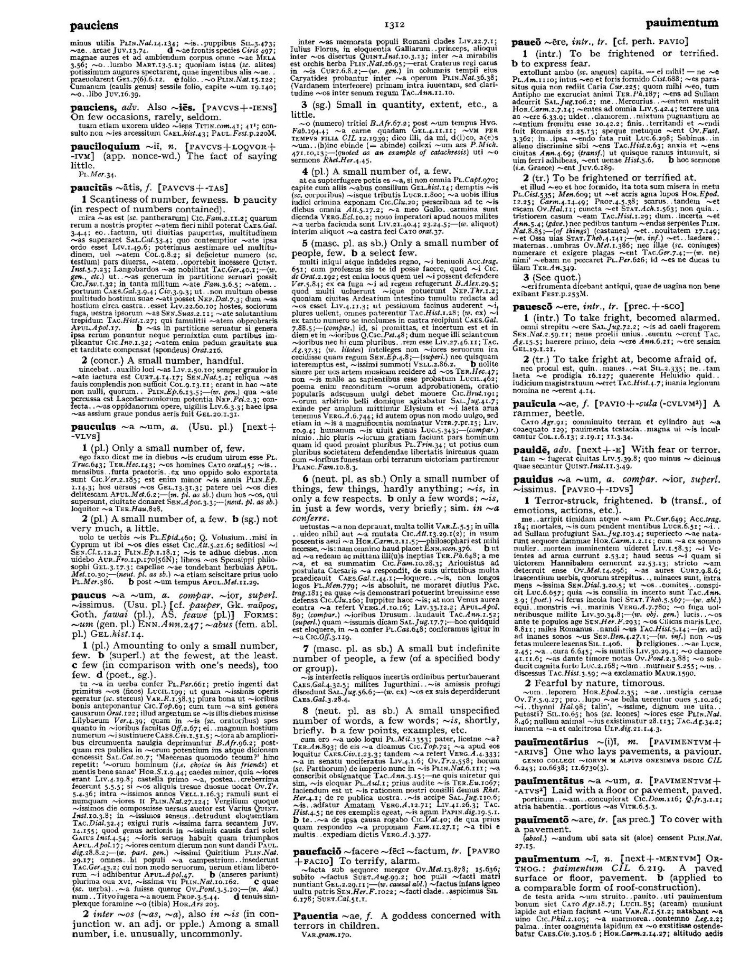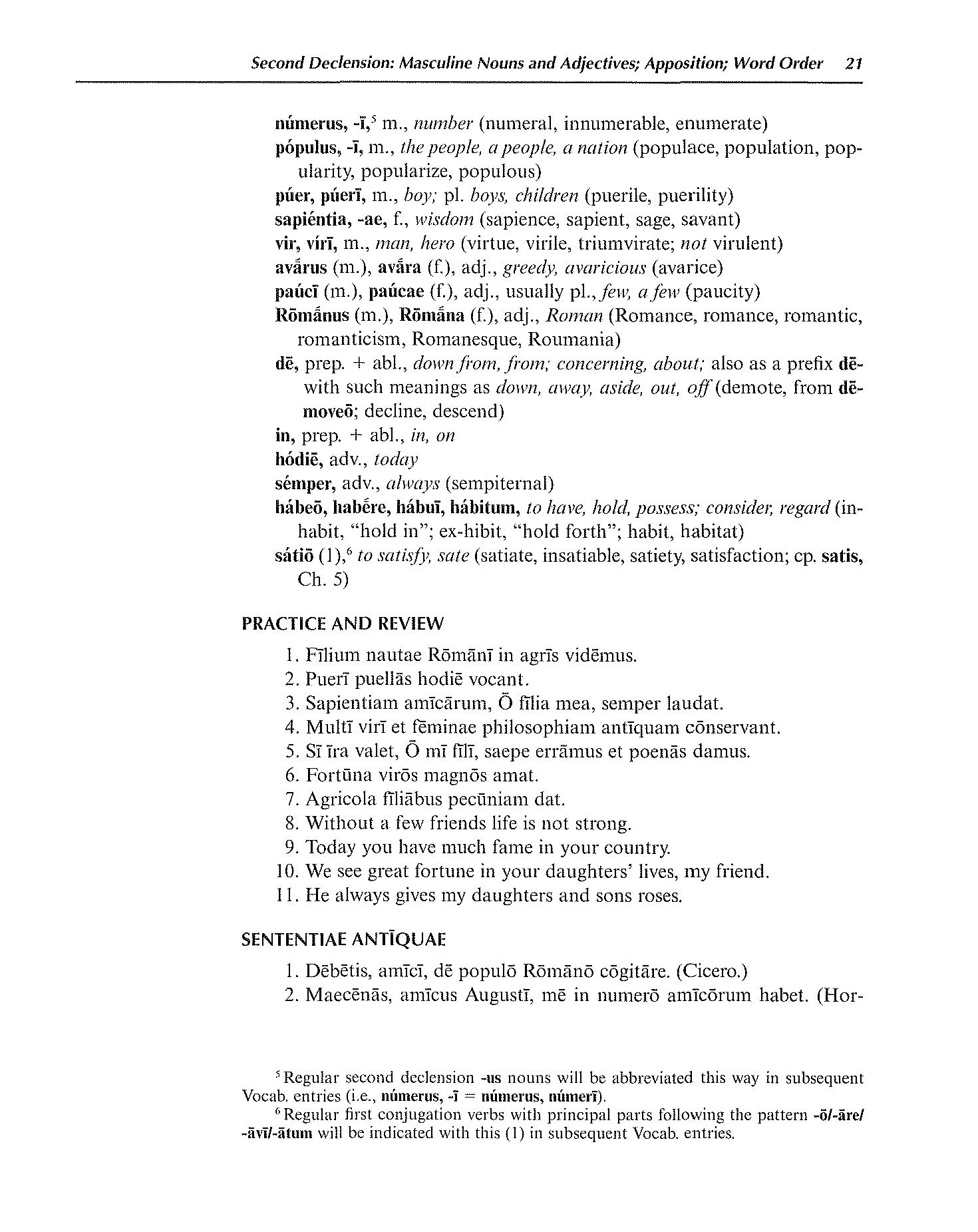
page_listing.tpl
page_subListingDetails.tpl
sub_listingDetails_style1.tpl
sub_listingDetails.title.tpl
paucī few
paucī is a Latin Adjective that primarily means few.
Definitions for paucī
Wheelock's Latin
Adjective
- 1
few, a few
English derivatives:
paucity
Oxford Latin Dictionary
Adjective
- 1
(pl.) Amounting to only a small number, few. (b) (superl.) at the fewest, at the least. (c) few (in comparison with one's needs), too few. (f) (poet, sg.).
- 2
(in conjunction w. an adj. or pple.) Among a small number, i.e. unusually, uncommonly.
- 3
(sg.) Small in quantity, extent, etc., a little.
- 4
(pl.) A small number of, a few.
- 5
(masc. pl. as sb.) Only a small number of people, few. (b) a select few.
Sentences with paucī
Latin to English
Paucī de perīculō cōgitant.Compare Few (men) are thinking about the danger.
Vīta paucīs virīs fāmam dat.Compare Life gives fame to few men.
Vērī amīcī sunt paucī.Compare True friends are few.
Paucī hominēs virtūtī cūram dant.Compare Few men give attention to excellence.
Paucī cīvitātī nostrae grātiās agēbant.Compare Few men were thanking our state.
Paucī amōre vēritātis amīcitiaeque tenēbuntur.Compare A few will be possessed by love of truth and friendship.
Sunt Caesarī paucī equitēs.Compare Caesar has few cavalry (literally, There are few cavalry to Caesar).
Paucae domus studiorum seriis cultibus antea celebratae, nunc ludibriis ignavae torpentis exundant.Compare The few houses that were formerly famed for devotion to serious pursuits now teem with the sports of sluggish indolence.
Data sources
Notes
- Definitions
- Frederick M. Wheelock, Wheelock's Latin, 6th ed., rev. Richard A. LaFleur (New York, NY: HarperCollins Publishers, 2005): 21.
- P. G. W. Glare, Oxford Latin Dictionary, Vols. 1-8 (Oxford: Clarendon Press, 1982): 1312.
- Word frequencies
- Christopher Francese, "Latin Core Vocabulary," Dickinson College Commentaries, last modified 2014, http://dcc.dickinson.edu.
- Paul B. Diederich, The Frequency of Latin Words and Their Endings, PhD diss., (Columbia University, 1939).
- Louis Delatte, Suzanne Govaerts, Joseph Denooz, and Etienne Evrard, Dictionnaire fréquentiel et index inverse de la langue latine [Frequency Dictionary and Inverse Index of the Latin Language] (Liège, Belgium: Laboratoire d'analyse statistique des langues anciennes de l'Université de Liège [L.A.S.L.A.], 1981): 124.
Bibliography
Allen, Joseph H. Allen and Greenough's New Latin Grammar for Schools and Colleges: Founded on Comparative Grammar. Edited by James B. Greenough, George L. Kittredge, Albert A. Howard, and Benjamin L. D'Ooge. Boston, MA: Ginn & Company, 1903.
Crystal, David. A Dictionary of Linguistics and Phonetics. 6th ed. Oxford, UK: Blackwell Publishing, 2008.
Delatte, Louis, Suzanne Govaerts, Joseph Denooz, and Etienne Evrard. Dictionnaire fréquentiel et index inverse de la langue latine [Frequency Dictionary and Inverse Index of the Latin Language]. Liège, Belgium: Laboratoire d'analyse statistique des langues anciennes de l'Université de Liège (L.A.S.L.A.), 1981.
Diederich, Paul B. The Frequency of Latin Words and Their Endings. PhD diss., Columbia University, 1939.
Francese, Christopher. "Latin Core Vocabulary." Dickinson College Commentaries. Last modified 2014. http://dcc.dickinson.edu/latin-vocabulary-list.
Gildersleeve, Basil L., and Gonzales Lodge. Gildersleeve's Latin Grammar: Third Edition, Revised, and Enlarged. 3rd ed. London, England: Macmillan and Co., 1903.
Glare, Peter G.W. Oxford Latin Dictionary. Vols. 1-8. Oxford, England: Clarendon Press, 1982.
Krüger, Bernd. "Latin Conjugation Tables." Cactus2000. Accessed May 5, 2023. https://latin.cactus2000.de/index.en.php.
Pierson, Nick. "Sound of Text." Accessed October 26, 2019. https://soundoftext.com.
Wheelock, Frederick M. Wheelock's Latin. 6th ed. Revised by Richard A. LaFleur. New York, NY: HarperCollins Publishers, 2005.
Wiktionary Contributors. "Victionarium." Wikimedia Foundation, Inc. Updated March 18, 2019. https://la.wiktionary.org/wiki/Victionarium:Pagina_prima.
Citation
Chicago (17th ed.)
Allo Contributors. "paucī (m), paucae (f) (adj.) - Latin Word Definition." Allo Latin Dictionary. Last modified . Accessed February 20, 2026. http://ancientlanguages.org/latin/dictionary/pauci-paucae.
Entry created on . Last updated on .







